Roald Dahl and Philosophy
Roald Dahl and Philosophy
A Little Nonsense Now and Then
Edited by Jacob M. Held
ROWMAN & LITTLEFIELD
Lanham Boulder New York Toronto Plymouth, UK
Published by Rowman & Littlefield
4501 Forbes Boulevard, Suite 200, Lanham, Maryland 20706
www.rowman.com
10 Thornbury Road, Plymouth PL6 7PP, United Kingdom
Distributed by National Book Network
Copyright 2014 by Rowman & Littlefield
All rights reserved. No part of this book may be reproduced in any form or by any electronic or mechanical means, including information storage and retrieval systems, without written permission from the publisher, except by a reviewer who may quote passages in a review.
British Library Cataloguing in Publication Information Available
Library of Congress Cataloging-in-Publication Data
Roald Dahl and philosophy : a little nonsense now and then / edited by Jacob M. Held.
pages cm
Includes index.
ISBN 978-1-4422-2252-6 (pbk. : alk. paper) ISBN 978-1-4422-2253-3 (electronic)
1. Dahl, RoaldCriticism and interpretation. 2. Philosophy in literature. 3. Childrens stories, EnglishHistory and criticism. I. Held, Jacob M., 1977 editor of compilation.
PR6054.A35Z857 2014
823'.914dc23
2013048452
 TM The paper used in this publication meets the minimum requirements of American National Standard for Information Sciences Permanence of Paper for Printed Library Materials, ANSI/NISO Z39.48-1992.
TM The paper used in this publication meets the minimum requirements of American National Standard for Information Sciences Permanence of Paper for Printed Library Materials, ANSI/NISO Z39.48-1992.
Printed in the United States of America
Dedicated to me, Jacob M. Held,
without whom none of this would have been possible.
Acknowledgments
I would like to acknowledge all of those who supported me during the completion of this project, from my loving family to all of my contributors. I would also like to thank Jon Sisk at Rowman & Littlefield for originally being receptive to Dr. Seuss and Philosophy. Thanks also to Marissa Parks, whose idea for another childrens literature and philosophy book was the impetus for the one you currently hold.
Finally, early in the summer of 2013 I lost Vlad, my dog. The whole family loved him. But he was my dog. My wife convinced me to get him when I was in graduate school. He was my first child. With Vlad, everything changed. The impact he had on me was profound. I am a better person for having had him as a companion. I loved him dearly and miss him daily. Thank you, Mr. Puss, for everything.
Hence we see the four-footed friendships of so many men of a better nature; for how could we recover from the endless dissimulation, duplicity, perfidy, and treachery of men if it were not for the dogs into whose open and honest eyes we can look without distrust?
Arthur Schopenhauer (17881860)
Introduction
Jacob M. Held
Roald Dahl and Absurdity: Childrens Literature and
the Divorce between the Mind That Desires and
the World That Disappoints
There is but one truly serious philosophical problem, and that is suicide. Judging whether life is or is not worth living amounts to answering the fundamental question of philosophy. All the rest... comes afterwards. So begins Camus, and so shall we also begin. It may seem odd, if not downright perverse, to open a book on Roald Dahl with a quote about suicide. Dahl is the author who brought us Matilda and Willy Wonka, James Henry Trotter, and the Big Friendly Giant. Dahls works seem to speak to a love of life and a celebration of childhood that is antithetical to the depression and violence of taking ones own life. But nothing could be more fitting than to open this book with the question of what makes life worth living.
If we begin by revisiting Dahls most well-known protagonists, Matilda Wormwood, Charlie Bucket, James Trotter, George Kranky, Danny, Sophie, and the boy from The Witches, we see that the question of suicide, or rather the question of finding value in a chaotic world, is not so out of place. Matildas parents are abusive when not neglectful, and as a vulnerable child she seems to be helpless to escape her fate. Charlie is starving to death alongside his impoverished family; Jamess parents were killed by a rogue rhino, leaving him to the care of his physically and emotionally abusive aunts; and so on. Roald Dahls stories dont begin joyfully. He never opens a book with the words Everything was pleasant.... Were he to do so, readers familiar with his other works would be waiting for the inevitable tragedy. Dahl would only start out uplifting to make the inevitable fall more poignant. James and the Giant Peach begins, Here is James Henry Trotter when he was about four years old. Up until this time, he had a happy life. Up until life struck. Dahl doesnt begin upbeat, so why should we?
Dahl begins where his protagonists, usually children, find themselves, where most human beings find themselvesin the thrall of existence, in the turmoil that is life, the divorce between our desires and a disappointing world. Dahls children find themselves where humanity exists, somewhere between their ideals, their fantasies about what life should be, and the reality of their situation, disappointment, and suffering. James Trotter knew happiness, until his parents were eaten by a rhino. Now he lives in between his dreams of a happy life of family and friends and the reality of his Aunts Spiker and Sponge. Matilda finds herself caught between ideals shes formed, having read accounts of happy lives in books, and the reality of living among the Wormwoods, small-minded bullies who seem to revel in inhibiting Matildas pursuit of happiness. And so we have the common theme among Dahls stories: our lives speak to the absurdity of human existence, the fact that there is an unbridgeable gulf between what we demand of this world and what we know to be true. The absurd is born of this confrontation between the human need and the unreasonable silence of the world. We need meaning and purpose; we need hope, a reason to continue on. But the world is silent; it offers nothing. And so we find the connection between Roald Dahls work and the question of suicide, the question of whether life is worth living.
The answer Albert Camus (19131960) offers is the answer Dahl shows us through each of his heroes and heroines: Everything considered, a determined soul will always manage. So even before she develops her powers of telekinesis, Matilda manages through her trips to the village library and by periodically exacting revenge on her parents. Even though he loses his magic crocodile tongues, James perseveres. He doesnt need magic; he is enough to overcome his situation. Magic may provide him opportunities, but it is through his ingenuity, through his actions, that the peach is saved from a shark attack, Cloud-Men, and every other tragedy that confronts him and his comrades on their journey. George takes matters into his own hands to deal with his wretched grandmother, making his marvelous medicine. It is Charlie, through a bit of luck but also through his own moral uprightness, who perseveres in the face of adversity and earns the right to be Willy Wonkas heir. Everything consideredbeing orphaned, poor, abused, young, weak, vulnerable, a mousethe determined souls, like James, Charlie, Matilda, and the boy from The Witches, will manage. And they dont simply managethey succeed; they revel in their rebellion against a chaotic world.
In the work of Roald Dahl, there is no shortage of pain and suffering. His protagonists never come from happy homes. And that is probably a good thing. Who wants to read about a spoiled child or one who has always had things easy? Such a story wouldnt resonate because wed see it for what it was: an irrelevant fantasy, a simple distraction. But no childs life will be pain-free or easy; we all have to struggle and suffer, and we have to learn how to deal with that fact, how to cope with what life is: hard. So we see James, whose parents are killed by a rogue rhino and who is forced to live with emotionally and physically abusive aunts. Or we see Charlie Bucket, a poor child on the verge of starvation struggling to make it in a world of gluttonous, spoiled brats. Sophie, before she meets the Big Friendly Giant, lives in an orphanage. Matilda is neglected and emotionally abused at home and sent to a school where education looks strikingly like punishment. Even Dahls autobiography,
Next page
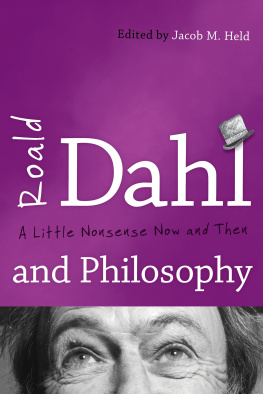
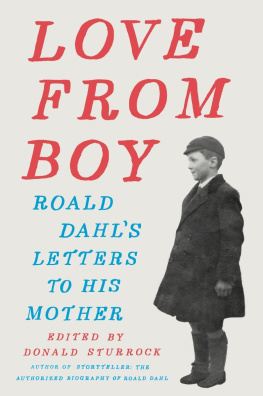
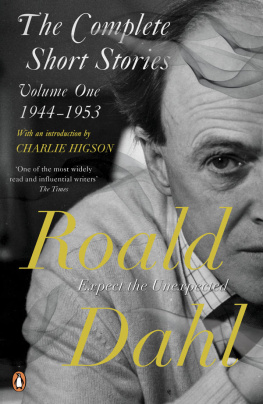

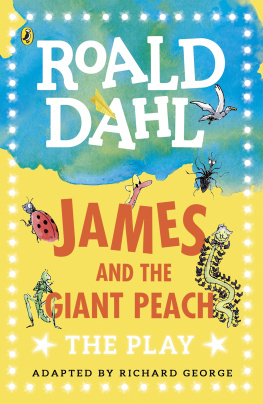
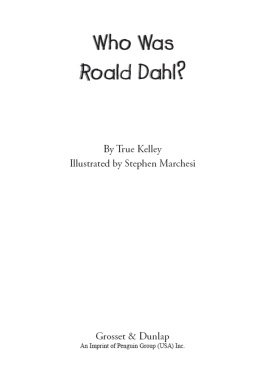
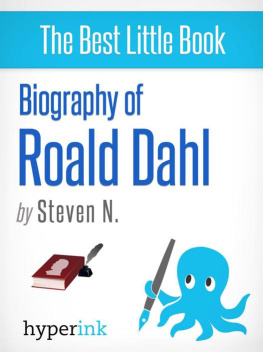
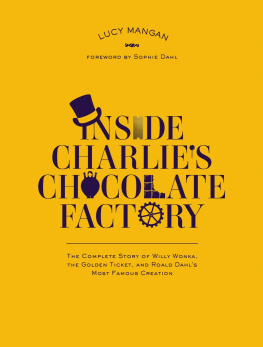
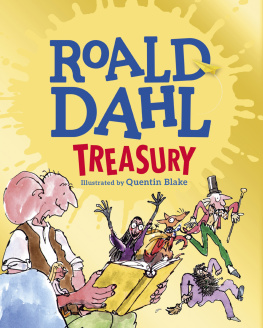

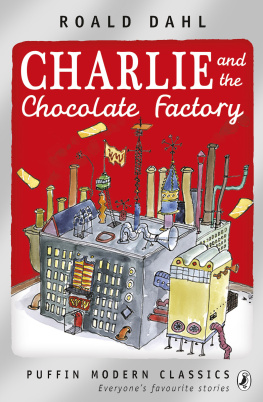
 TM The paper used in this publication meets the minimum requirements of American National Standard for Information Sciences Permanence of Paper for Printed Library Materials, ANSI/NISO Z39.48-1992.
TM The paper used in this publication meets the minimum requirements of American National Standard for Information Sciences Permanence of Paper for Printed Library Materials, ANSI/NISO Z39.48-1992.